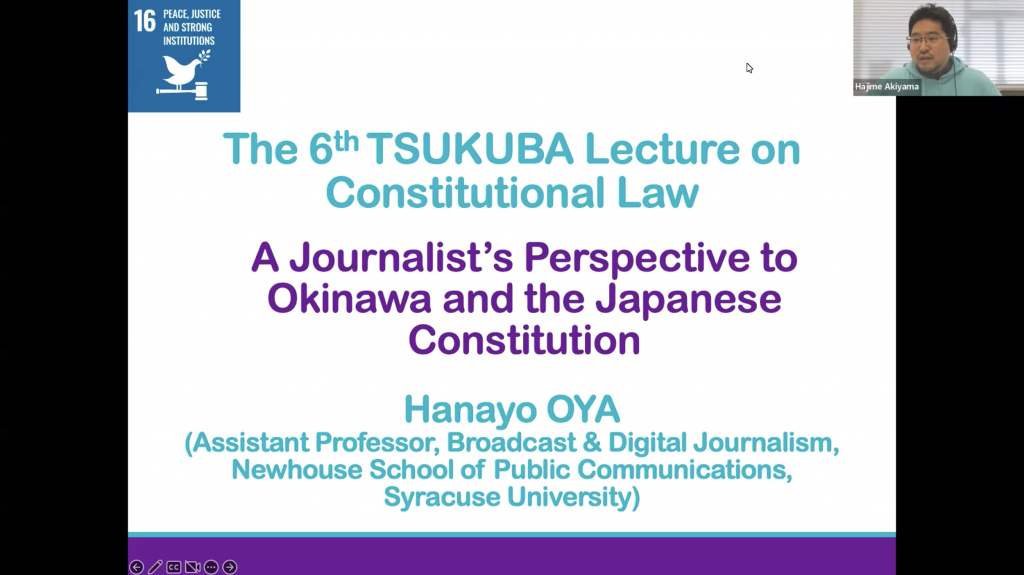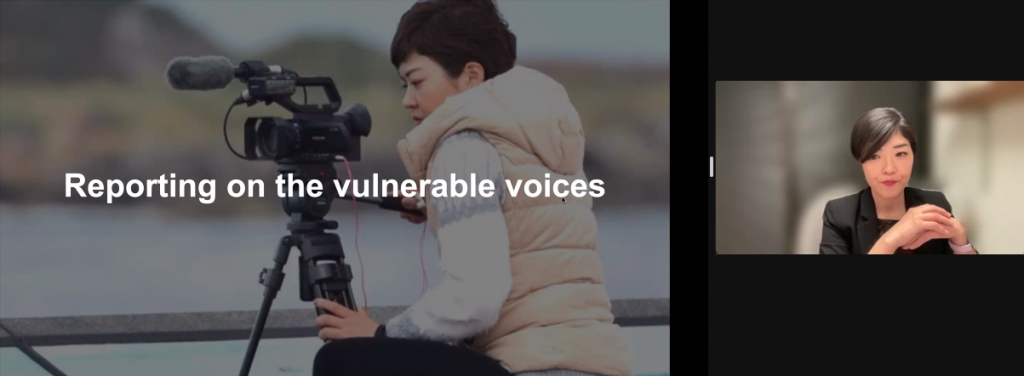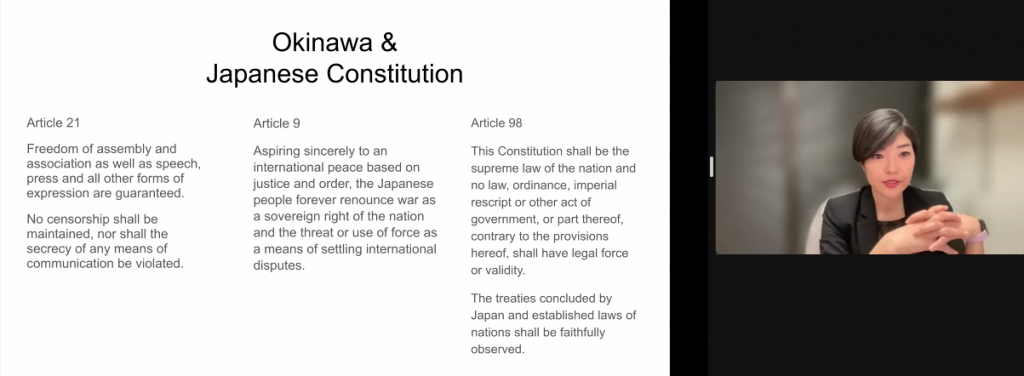THE 6TH TSUKUBA LECTURE ON CONSTITUTIONAL LAW “A Journalist’s Perspective on Okinawa and the Japanese Constitution” WAS HELD
On February 14, 2023, the 6th TSUKUBA Lecture on Constitutional Law took place virtually. The guest speaker, Hanayo Oya, is a journalist, documentary filmmaker, producer, and Assistant Professor of Broadcast & Digital Journalism at Syracuse University’s Newhouse School of Public Communications. The lecture’s topic was “A Journalist’s Perspective on Okinawa and the Japanese Constitution,” and it was moderated by Assistant Professor Hajime Akiyama of the Faculty of Humanities and Social Sciences.

During the lecture, Ms. Oya discussed three topics: the importance of journalism, World War II and Okinawa, and American military bases and the U.S.-Japan Status of Forces Agreement.
In the first part, she explained that journalists have important roles as watchdogs, canaries in a coal mine, and truth seekers rather than just reporting what is happening. Article 21 of the Japanese Constitution protects freedom of speech for journalists, making the proper functioning of journalism essential for democracy. She expressed a strong commitment to giving voice to vulnerable people, citing examples such as survivors of the Cambodian genocide, those affected by the invasion of Afghanistan, African Americans during the Black Lives Matter movement, and people in Puerto Rico who lack the right to vote in federal elections.

In the second part of the presentation, the focus shifted to “World War II and Okinawa,” which was her primary area of interest. She explained that during the war, journalism lost its original purpose and instead became a tool for supporting the authorities and encouraging people to fight. She then discussed the “Monument to Newspaper Men Who Fell in War” located in Asahigaoka, Wakasa, Naha city. The speaker emphasized that the monument serves not only as a tribute to the journalists who lost their lives in the Battle of Okinawa in 1945 but also as a reminder of the true role of journalism, which is to assist people rather than to sacrifice them.
Her significant contributions to Okinawa include the production of a documentary and book about “wartime malaria.” Malaria, an endemic disease of the Yaeyama islands during WWII, claimed numerous lives on the islands. However, “war malaria” does not pertain to sickness and fatalities during wartime: It was the Japanese military that forced the Yaeyama people to relocate to a malaria-infested area in order to secure combat rations and prevent locals from leaking information to the U.S. forces–in other words, “spy activities”–which caused the malaria outbreak. The death toll of civilians reached more than 3,600.
During her documentary production on the Yaeyama islands, she managed to interview more than 40 survivors and uncover the truth of wartime malaria, despite facing many refusals due to people’s hesitancy to speak out about their experiences. She immersed herself in the Yaeyaman culture, learned their language, and participated in their festivals, thus building good relationships. Eventually, she succeeded in producing the documentary with the interviews she wished to include.
In the third part, “U.S. Military Bases and the Status of Forces Agreement,” she first introduced that despite the supreme law of Japan in Article 98 of the Japanese Constitution, the U.S.-Japan Status of Forces Agreement limits Japanese investigative and judicial authority in cases of accidents involving American military personnel stationed in Japan and grants extraterritorial privileges, such as secret agreements to waive judicial authority over American military personnel at U.S. bases, and also threatens the rights of many Okinawa residents.
For instance, between 2008 and 2019, 5,177 crimes were committed by U.S. military personnel, but approximately 80%, or 4,107 cases, have not been prosecuted. This is due to a number of reasons, including Japan’s lack of rights under the Status of Forces Agreement to investigate U.S. military bases and accidents, as well as a secret agreement between the U.S. and Japanese governments in the 1950s that waived jurisdiction over U.S. military personnel.
The journalists exposing such injustices have been put in difficult positions: As a result of specially designated secret acts introduced in 2013, journalists could be sentenced to up to ten years in prison if found to have violated the law.

During the Q and A session following her presentation, a participant posed a question about why she chose to live and study in the U.S. despite her focus on Okinawa. Her response was that she aspired to become an educator so that she could educate younger generations in the U.S. about the impact of the actions of the U.S. forces and government on Okinawa. In her presentation, she also provided an explanation for why American citizens continue to support the U.S. forces and government despite their oppressive actions towards Okinawa.
She stated that the U.S. has many problems within its borders and cannot prioritize Okinawa. Similarly, we as Japanese tend to neglect individuals who are in vulnerable positions due to our busy daily lives. However, in Okinawa, people face daily infringements and threats to their rights. Despite the constitutional guarantee of equality, certain individuals are unfairly oppressed. To uphold democracy and the constitution, it is our duty to not remain silent and instead listen to the voices of the vulnerable through journalistic reporting and speak out on their behalf.
Written by Kota Noji, a fourth-year student, College of Social Sciences
*TSUKUBA Lecture on Constitutional Law
This lecture series is designed to bring diverse perspectives to students at the University of Tsukuba, where students from different specialties gather, and to provide an opportunity to learn about constitutional law. Some lectures are held in Japanese, and some lectures are held in English. TSUKUBA Lecture on Constitutional Law covers issues related to SDGs. The 6th lecture was related to Goal 16: “Peace, Justice and Strong Institutions.”

